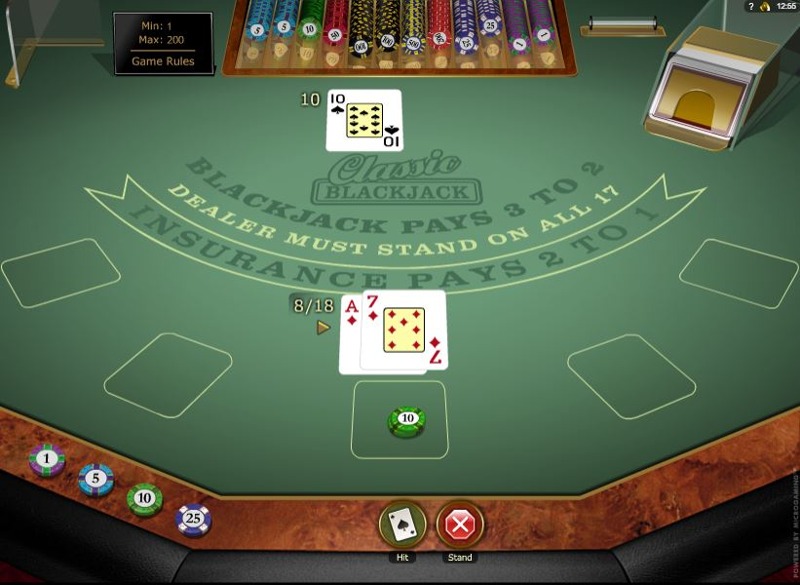 The aim of playing a standard game of Blackjack is to get a stronger (higher valued) hand than that of the dealers, without exceeding 21.
The aim of playing a standard game of Blackjack is to get a stronger (higher valued) hand than that of the dealers, without exceeding 21.
There are dozens of different Blackjack variants, all of which come with different rules and payouts. The house edge of these games varies significantly from game to game, but in many cases Blackjack has one of the highest RTP (return to player) values, making it one of the smartest games to play.
Blackjack Articles & Guides
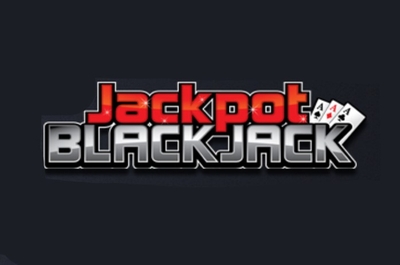
Progressive Jackpot Blackjack Games
Blackjack is a game geared more towards long play sessions containing many games with low payouts, but the inclusion of a progressive jackpot or side bet that equates as such turns it into a game that can change lives in a single lucky hand.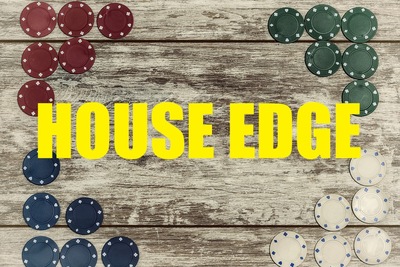
What Is the House Edge in Blackjack?
The house edge is important in any casino game, but few games have as much flexibility with the house edge as blackjack, so players need to be aware of the rules they are playing to ensure they aren't being taken for a ride.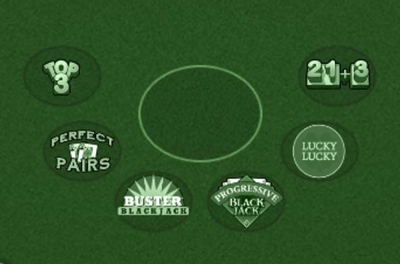
What Types of Blackjack Side Bets Are There?
Blackjack is a game that lends itself to side bets, and as such there are scores of them out there. We deal with the mainstays in this article, and discuss how they work and whether or not they are worth considering alongside your regular game.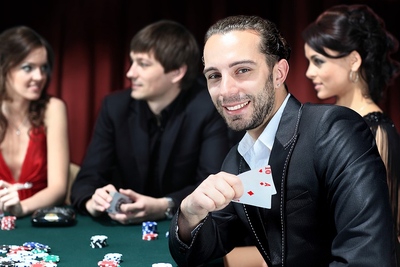
Blackjack Tournaments: What Are They & How Do They Work?
Although poker tournaments are well known, watched, and talked about, blackjack tournaments don't share the same popularity. That doesn't mean they don't exist though, some more exclusive tournaments have even been televised in the past, and anyone can take part in smaller tournaments online.
What's The Difference Between Blackjack & Pontoon?
Although the games are similar in many ways they are not connected historically, and while the aim of the game may be the same the rules along the way are dramatically different in a number of areas.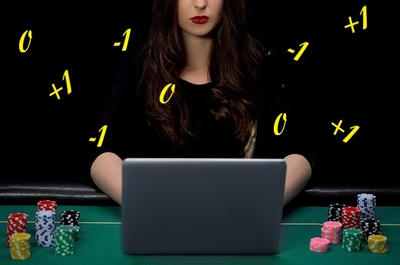
Is Card Counting Possible Online in Live Blackjack?
Card counting is a legal and effective way to legitimately beat the dealer in a game of blackjack, but the conditions need to be right for it to work. But is this unique skill transferrable to playing online, and what are the barriers the casino put in the player's way to stop it?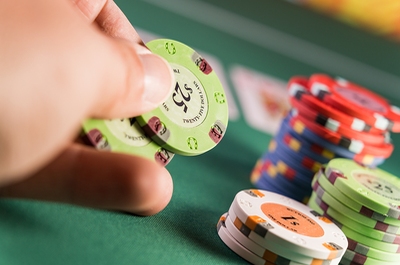
How Does Betting Behind in Blackjack Work?
It may not be a familiar concept to more casual blackjack players, but betting behind is perfect when a table is full or when you want to get through more hands per hour than would otherwise be possible.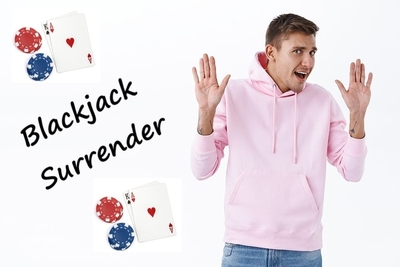
When to Surrender in Blackjack
It might not be a rule that many players are even aware of, but when used correctly the surrender rule can tip the balance further in the player's favour and eat away at the house's edge. It's a double edged sword though, and if used in the wrong situation it can leave you worse off.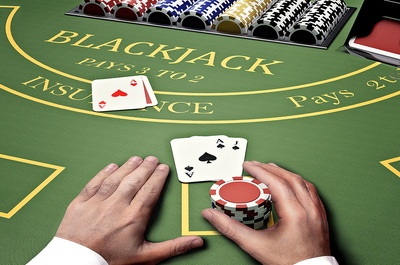
What are the Odds of Being Dealt Blackjack?
The hand the game is all about. It's a guaranteed winner but what are the chances of actually getting it, and are those chances the same for the dealer?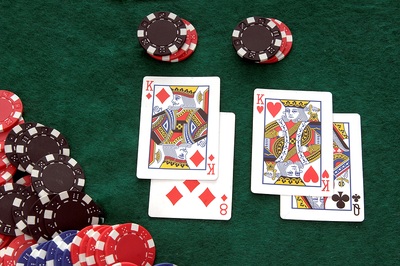
When to Split in Blackjack
To split or not to split, that is the question. The answer is dependant on your hand and the dealer's hand, and it can change with different variations of the game, but the most common rules are outlined here.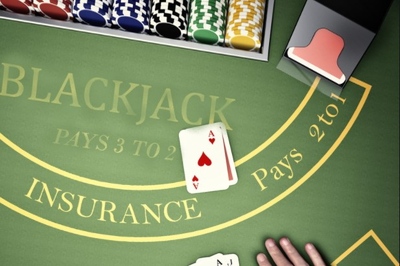
Is Blackjack Insurance Worth Taking?
Ever wondered why insurance is offered by the casino? This seemingly generous offer might seem like a good idea, but does it really hold any value, and if it does when should you take it and when is it best left alone?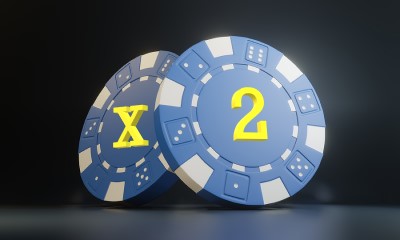
Doubling in Blackjack & When You Should Do It
Many recreational players ignore the option to double down when playing blackjack, but there are some scenarios where doubling is actually a key tactic if you want to minimise the house edge and give yourself the best possible chance of winning money long term.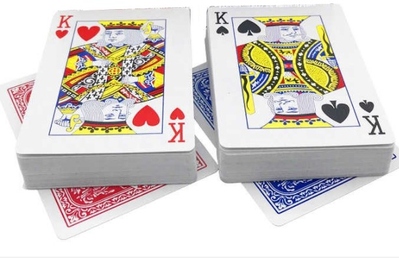
How Does Number of Decks Affect the House Edge in Blackjack?
You might think that the number of decks involved in a game of blackjack wouldn't make too much of a difference to your chances of winning, but you would be wrong. Even with an optimal strategy, the number of decks can have a big impact over the course of many hands.How To Play
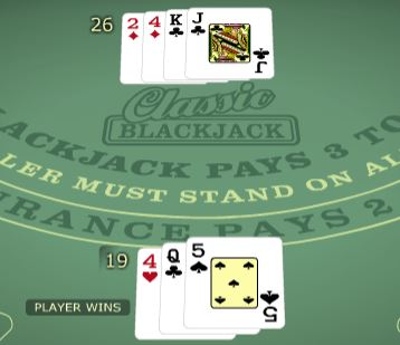 Playing is relatively simple. You start by placing a wager in the betting box directly in front of you on the table. The dealer will then deal out cards to himself, you, and any other players involved if you are playing a multi-player game.
Playing is relatively simple. You start by placing a wager in the betting box directly in front of you on the table. The dealer will then deal out cards to himself, you, and any other players involved if you are playing a multi-player game.
With the exception of aces, the cards you are dealt are all worth their face value, with all picture cards being worth 10. Aces are the only oddball, which can be worth either 1 or 11 depending on which would make you a better hand; so an Ace and a 5 could either be 6 or 16. It is important to note that if you have two cards and one is an Ace, it is impossible to bust on your next card.
Once you have received your cards, you must then decided what action you wish to take. A summary of the options available to you is given below, however the actual options you have may vary depending on the variation you are playing:
- Stand – If you have a strong hand of 17 or over you could decide to stand. This means that no further cards will be dealt to you.
- Hit – If you have a lower value hand you might choose to hit, and request another card. If the card drawn makes your total over 21, then you have ‘busted’ and are out of the game. If your total is under 21 you have the option to stand or hit again.
- Double Down – When you double down you need to place an additional wager equal to your initial bet, after which you will receive one more card. Regardless of the value of your hand, you cannot draw any further cards after this. Some casinos will restrict when you can double down to when you have a hand value of 9, 10 or 11; whilst others will let you do it whenever you like.
- Split – Splitting cards is done when you are dealt a pair of cards – such as two 9’s or two aces. In this context, any card with a value of 10 is considered the same – so a ten and a queen could be split if you so wished. To split you must place an additional wager equal to your original bet, and then your cards are separated into two hands. Each hand then receives a second card. Once you have split your cards you will then play as normal, with the options of standing, hitting, doubling down or even splitting again if you are dealt another pair. Note: Some casinos or versions of Blackjack may have restrictions on how many times you can split, or whether or not you can double down after a split.
- Surrender – Only possible in certain games. Here, you have the option of surrendering if you have a poor hand, and if you surrender you will receive half of your wager back and the game ends.
If you are dealt a 21 in your first two cards (an ace and a 10, or an ace and a queen), this is known as Blackjack and is paid out at 3 to 2, unless the dealer also has a Blackjack, in which case you will tie.
If the dealer is showing an ace you will also have the option of buying ‘insurance’ for half of your wager. If the dealers’ second card is a 10, then your insurance bet is paid out at 2 to 1, meaning you get your total wager returned to you.
Hints and Tips
Knowing the house edge of the game you are playing is very important, as they can vary significantly between games. Common sense dictates that you want to play the version with the lowest house edge or the highest RTP – which is the opposite of the house edge.
Blackjack is actually a very mathematical game and changing any of the variables will affect the payouts. These variables include the number of decks, how the dealer plays, whether the dealer checks for Blackjack or not, and so on. Most casinos will tell you the house edge if you ask, and many will list it in the specific game rules.
Variations
In the next section, we will summarise the different types of Blackjack games that are available online. Some variations only involve small changes to the standard rules, whilst others are completely unique games.
Classic Blackjack
This is the most basic of all Blackjack variations, and most venues both online and offline offer it. The exact game on offer will vary between casinos, and even between Blackjack games within the same casino. These variations will include the number of decks used, as well as the specific rules that the dealer follows.
Single Deck Blackjack
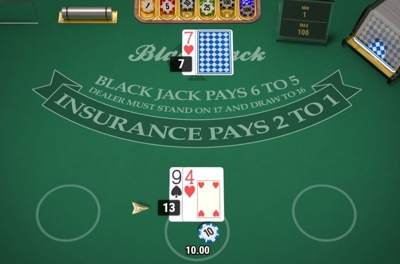 As the name suggests, it is played with just one single deck of cards. The deck is usually shuffled after each hand to limit the benefits of card counting.
As the name suggests, it is played with just one single deck of cards. The deck is usually shuffled after each hand to limit the benefits of card counting.
Progressive Blackjack
Whilst you will find the basic betting moves and standard payouts offered on Progressive Blackjack games, you will also notice an additional side bet that pays a jackpot for certain hand combinations. The most common jackpot is when your first cards are suited 7’s.
A common paytable for a Progressive Blackjack game is as follows (all based on a 1 chip bet):
- 1 seven would result in a payout of 5 chips
- 2 sevens of any suit would result in a payout of 25 chips
- 2 suited sevens would would in a payout of 50 chips
- 3 sevens of any suit would payout 250 chips
- 3 sevens of the same suit would payout 1,000 chips
- 3 seven of diamonds would payout the progressive jackpot – which could easily be in the hundreds of thousands of chips.
In the example given above only your first two cards count – with the exception of the three card payouts which include your first two cards plus a third card from a ‘hit’. As with many forms of Blackjack, multiple decks are used – which explains how you can have two or even three sevens in the same suit.
Pontoon
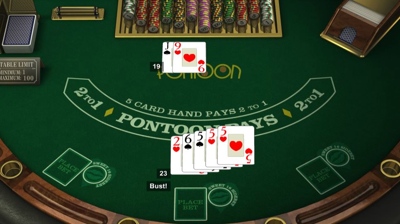 This is one of the older casino card games and is very similar to Blackjack. The betting and game play options all have different names, so you will ‘stick’ instead of stand and ‘twist’ instead of hit. Buying a card is the equivalent of doubling down. The main difference between Pontoon and Blackjack is the addition of an extra payout when you make a ‘five card trick’ (sometimes called a five card charlie) which will pay out at 2 to 1. A five card trick is when you hit to five cards and still have a hand of 21 or under (ie: you haven’t gone bust).
This is one of the older casino card games and is very similar to Blackjack. The betting and game play options all have different names, so you will ‘stick’ instead of stand and ‘twist’ instead of hit. Buying a card is the equivalent of doubling down. The main difference between Pontoon and Blackjack is the addition of an extra payout when you make a ‘five card trick’ (sometimes called a five card charlie) which will pay out at 2 to 1. A five card trick is when you hit to five cards and still have a hand of 21 or under (ie: you haven’t gone bust).
Live Blackjack
Regular online games are played with cards selected using a random number generator (RNG). With Live Blackjack you will be playing not against a random number generator but against a real live dealer who is dealing out the cards in a land based gaming venue. You place your bets remotely from your home computer and then watch the entire game unfold via a video feed which is broadcast in real time from the gaming venue. Some games are broadcast from special studios, whilst others actually take place in a real casino.
Blackjack Switch
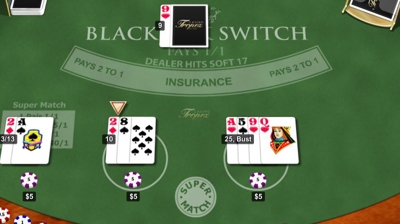 This game will let you do something which is usually regarded as cheating – swap cards from one hand to another. In this game you must play exactly two hands – no more no less – and you have the option of swapping cards between the hands immediately after the hands are dealt. This gives you the opportunity to turn a bad hand into a good one.
This game will let you do something which is usually regarded as cheating – swap cards from one hand to another. In this game you must play exactly two hands – no more no less – and you have the option of swapping cards between the hands immediately after the hands are dealt. This gives you the opportunity to turn a bad hand into a good one.
Blackjack Surrender
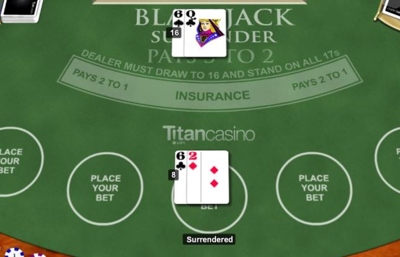 The usual payouts and betting moves are in play here, however, you are also given the option to surrender your hand if it doesn’t look like it will win. When you surrender your hand, you receive half of your bet back and the game ends. There are actually two versions of this game – ‘Late Surrender’, where the Dealer has checked his hand for a Blackjack, and ‘Early Surrender’ where you can surrender before the dealer checks for Blackjack. Out of the two variations, the latter favours the player the most.
The usual payouts and betting moves are in play here, however, you are also given the option to surrender your hand if it doesn’t look like it will win. When you surrender your hand, you receive half of your bet back and the game ends. There are actually two versions of this game – ‘Late Surrender’, where the Dealer has checked his hand for a Blackjack, and ‘Early Surrender’ where you can surrender before the dealer checks for Blackjack. Out of the two variations, the latter favours the player the most.
Double Exposure Blackjack
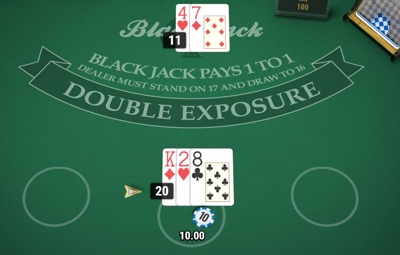 This game is rather unusual in that both of the dealers cards are always dealt face up – meaning you can see the current value of the hand you need to beat. There is a price to pay for this privilege though, and in this game a Blackjack only pays out at 1 to 1 rather than 3 to 2.
This game is rather unusual in that both of the dealers cards are always dealt face up – meaning you can see the current value of the hand you need to beat. There is a price to pay for this privilege though, and in this game a Blackjack only pays out at 1 to 1 rather than 3 to 2.
Hot Streak Blackjack
This is a fairly unusual game that pays out bonuses when you hit a streak. When playing you have the option of placing a side ‘hot streak’ bet which pays out for 2 or more consecutive wins. Each time you win a hand, your hot streak bet will move up the hot streak trail, collecting payouts until you lose a hand. For the second winning hand you receive a 1.5x bet payout, the third gets a 3x bet payout, and finally for winning four hands in a row you will receive a payout of 6x your bet. These payouts are cumulative, so if you reach the fourth hand you will actually have been paid out at 10.5x your side bet.
You can continue to place the hot streak bet as your bets are moving up the trail. So if you win your first hand and the hot streak bet moves to position 1, you can place an additional starter bet. If the next hand wins, position 2 will move to position 3 and position 1 will move to position 2, leaving the starter position open for a new bet if you so wish. A long winning streak with a new hot streak bet being placed each hand can result in some significant payouts.
Power Blackjack
This is rather a bizarre variant in that, while it has the usual betting options, it comes with a couple of oddball ones as well. For example, when you double down on a 9, 10 or 11 you have the option of changing the card that was dealt to you. Equally unusual is the ability to split your hand if you have been dealt a hard 15 or 16 – turning the worst starting hands into something better, potentially.
21+3 Blackjack
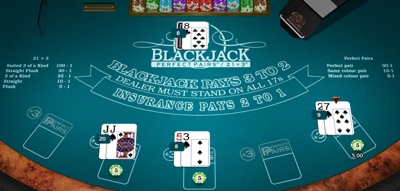 This is actually two games in one. The first is a standard Blackjack game, and the second is a Three Card Poker game based on your two cards and the dealers up card; perfect if you can’t decide between playing Blackjack or Three Card Poker. The payouts for the Three Card poker part of the game are as follows:
This is actually two games in one. The first is a standard Blackjack game, and the second is a Three Card Poker game based on your two cards and the dealers up card; perfect if you can’t decide between playing Blackjack or Three Card Poker. The payouts for the Three Card poker part of the game are as follows:
- Flush – 5 to 1
- Straight – 10 to 1
- 3 of a Kind – 33 to 1
- Straight Flush – 35 to 1
- Suited 3 of a Kind – 100 to 1
